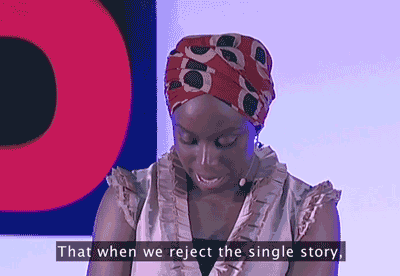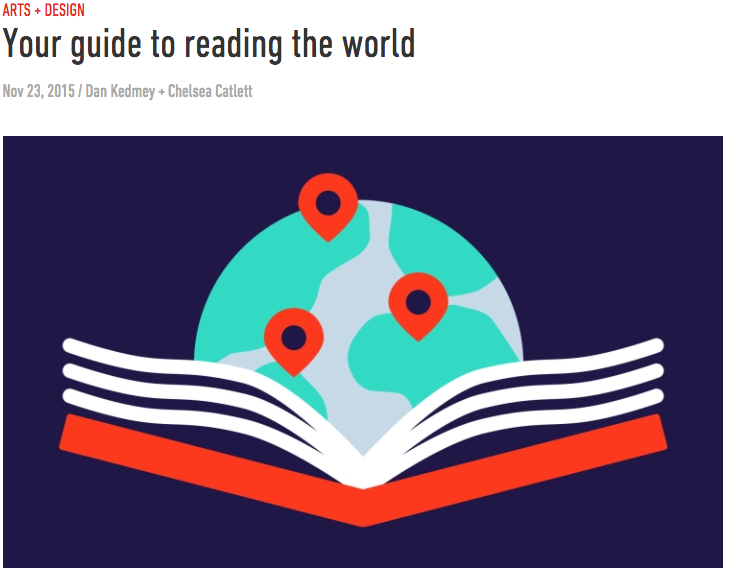There’s a difference between traveling to a place and vacationing there. Vacationing renders visions of relaxation and minimal effort, whereas traveling evokes thoughts of an adventure where Wi-Fi hotspots are few and far between. Here are some ways to think differently about the places you visit and the people you see before stepping out of that train, plane, automobile or boat.
1. Know some history
History offers context: it explains why buildings look a certain way, how foods became staples, what specific clothing styles and patterns mean, and which locations hold significance.
Generally, it’ll help you feel less lost as you wander through streets and interact with locals.
No one’s expecting you to become an expert overnight, or at all really. However, learning a few key facts about how an area, the people and their culture came to be demonstrates a basic level of respect. Skim through articles online or check out a book at your local library prior to your trip, or explore via Google’s Cultural Institute and Art Project.
Find out what LGBTQ life is like around the world; if you ever visit New York City, you might be interested to know what it looked like before it became a city; or you may even be shocked to discover, before you ride one, that camels aren’t originally from Middle East or the Horn of Africa at all.
Familiarize yourself within a place’s history, culture, art and science (politics too, if you’re feeling particularly passionate), and watch as your perspective of the world shifts just enough for things to take on a finer, clearer focus.
2. Think about how you’ll document your trip
A good question to ask yourself: Would you even go to this place if you weren’t allowed to take pictures? Try to keep your picture-taking habit in perspective, because focusing on your photos could keep you from truly immersing yourself in the moment and place. A few ways to be a smarter picture-taker:
- Maximize your time with minimal phone usage. The 1 Second Everyday app, created by director Cesar Kuriyama (TED Talk: One second every day), does the job nicely.
- Draw inspiration from this playlist all about capturing the stunning places of the Earth.
- Get some tips on how to take a great photo.
Here are a few key tips (check out the entire article to collect them all):
- Keep your lens clean and your battery charged. Yes, both of these things are obvious, but they’re also very easy to forget. Phones can get especially dirty from riding around in our pockets and getting our fingerprints all over them. So form a habit where every time you go to pick up your camera, you clean off your lens. You can wipe your lens with a lens cloth or a super soft fabric like an old T-shirt. But be careful; using a fabric that’s too rough will scratch.
- Light is king. If you remember one thing from this list, choose this one. Lighting is as valuable a tool as your camera itself. Generally, natural light from the sun is the best option. If you’re inside, raise the blinds and open the curtains to let in as much light as possible and, if you can, move your subject near the window.
- Use a reflector. Reflectors bounce light from the sun or a lamp onto an object. If you want to get that clean, professional studio look, use a white piece of poster board or foamcore to reflect light onto your subjects.
- Think before you shoot. This means taking time to consider what’s in the frame, and coming up with the best composition. Are there any water bottles or random objects that should be moved? Have you cropped off the top of someone’s head? Take some time to consider it.
- Mind the lines. Horizon lines should be straight unless you’re making them diagonal for a creative effect. I like to use the grid feature on my phone to make sure I’m not off. I also often use a 9-square grid like the one below that breaks my photo up into thirds. This is called the Rule of Thirds — aim to place the points of interest in your photo along the lines or where the lines cross, and your photos will naturally feel more balanced to the viewer.
3. Read a book* set wherever you’re going
*Fiction and nonfiction, if you can.
Books give you a good sense of the atmosphere of a place, the people you may encounter … Of course, people can’t be chalked up to imaginary situations and characteristics because that’s just stereotyping.
In the wise words of writer Chimamanda Ngozi Adichie (TED Talk: The danger of a single story):
“Stories matter. Many stories matter. Stories have been used to dispossess and to malign, but stories can also be used to empower and to humanize. Stories can break the dignity of a people, but stories can also repair that broken dignity,” she says.

It helps to learn about the people and the customs of a place so you don’t go charging in there acting like you’ve just dropped into a different planet. If you’re looking for a place to start, here’s 196 fictional novel recommendations (one from each country in the world).
4. Learn some of the language
It always useful to know at least a few words to help you get around. Like a bad friend, you don’t want to always drop into a place only to eat all the good food, find a comfy place to sleep and leave a few days later with barely a word exchanged.
“Why learn languages? If it isn’t going to change the way you think, what would the other reasons be? There are some,” says linguist John McWhorter. “One of them is that if you want to imbibe a culture, if you want to drink it in, if you want to become part of it, then whether or not the language channels the culture — and that seems doubtful — if you want to imbibe the culture, you have to control to some degree the language that the culture happens to be conducted in. There’s no other way.”
Here’s a simplified list from McWhorter’s talk (but watch the whole thing for all the language-lovin’):
- They are tickets to being able to participate in the culture of the people who speak them, just by virtue of the fact that it is their code.
- It’s been shown that if you speak two languages, dementia is less likely to set in, and that you are probably a better multitasker.
- Languages are just an awful lot of fun. Much more fun than we’re often told. They’re playful, if you let them be.
- We live in an era when it’s never been easier to teach yourself another language. Today you can lay down — lie on your living room floor, sipping bourbon, and teach yourself any language that you want to with wonderful sets such as Rosetta Stone. I highly recommend the lesser known Glossika as well. You can do it any time, therefore you can do it more and better.
If you need a little more motivation to sign up for a class, download an app, or leaf through an translation dictionary, check out the playlist below for TED Talks that’ll inspire you to learn a new language.

5. Understand where you come from
What does it mean to be from a place? For some, the answer is straight-forward and obvious. For others, the question isn’t as simple as it sounds. A thought experiment for yourself, as well as others you encounter while traveling — perhaps over beers or a card game — is to ask, “Where are you a local?” instead of “Where are you from?”
Taiye Selasi suggests an examination of life basics, which she calls the three “R’s”:
- Rituals. Think of your daily rituals, whatever they may be: making your coffee, driving to work, harvesting your crops, saying your prayers. What kind of rituals are these? Where do they occur? In what city or cities in the world do shopkeepers know your face?
- Relationships. Think of your relationships, of the people who shape your days. To whom do you speak at least once a week, be it face to face or on FaceTime? Be reasonable in your assessment; I’m not talking about your Facebook friends. I’m speaking of the people who shape your weekly emotional experience.
- Restrictions. How we experience our locality depends in part on our restrictions. By restrictions, I mean, where are you able to live? What passport do you hold? Are you restricted by, say, racism, from feeling fully at home where you live? By civil war, dysfunctional governance, economic inflation, from living in the locality where you had your rituals as a child? This is the least sexy of the R’s, less lyric than rituals and relationships, but the question takes us past “Where are you now?” to “Why aren’t you there, and why?”
“Take a piece of paper and put those three words on top of three columns, then try to fill those columns as honestly as you can,” Selasi says. “A very different picture of your life in local context, of your identity as a set of experiences, may emerge.”
Need a more in-depth exploration of what it means to be a thoughtful traveler? Or if you’re ready to set off on an adventure, but not quite sure where, check out these TED Talks to watch when you’re in the mood for adventure and this great list of talks to give you wanderlust.

